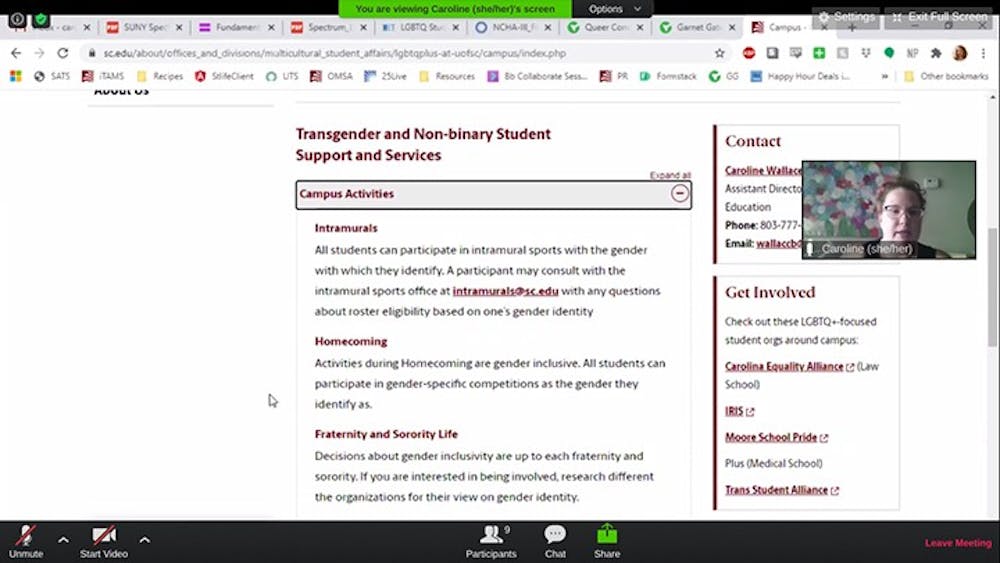The Office of Multicultural Student Affairs (OMSA) and the Department of Student Development partnered to virtually host Queer Connections (QC) Monday night.
QC is an initiative that aims to support incoming LGBTQIA+ students, helping them to build connections and find resources. The goal of QC is to help first-year LGBTQIA+ students adapt to university life and transition into the Carolina Community.
QC is a six-week program, and the purpose of the first meeting was to give those who attended an opportunity to learn about the resources available to LGBTQIA+ students and the policy and support services offered at USC.
Caroline Wallace, the assistant director for LGBT education in the Office of Multicultural Student Affairs, moderated the event. During her talk, she showed where all USC policies and support services can be accessed on the OMSA website.
Wallace stated the policy regarding intramural sports and other campus activities.
"If anyone's looking to participate in intramurals, or any campus activities at all, you are allowed to participate in the gender of which you identify," Wallace said. "The intramurals people have been trained and are very aware of this policy."
Wallace said there are health-related services for LGBTQIA+ students, including changing one's name on MyHealthSpace.
"You can change your name, your pronoun, your sex assigned at birth and your gender all in your health record on MyHealthSpace before you ever walk into a doctors office," Wallace said. "It will have both names in your chart, but you should always be referred to by your chosen name, and if you are not referred to by your chosen name and gender, you tell me, and I'll tell health services because, again, they take that really seriously."
For non-medical university records, the university uses information provided by the registrar as a default, which means information from one's birth certificate is used.
Wallace said there are additional services covered in the university's health insurance.
"It does cover hormone replacement therapy. It does cover counseling and psychiatry," Wallace said. "We also have a support group called T-Time that is specifically for trans and non-binary students."
Wallace said those who wish to have their housing reassigned do have that option.
"If you need to change rooms, if you do decide that you would like a different housing situation, you can contact [director of housing administration] Joe Fortune, and they will work with you to make sure you're in housing by your gender identity," Wallace said.
On the OMSA website, there is a notification request form to inform teachers of your name and gender. Wallace said she was willing to notify any professor for students herself if need be.

"I'm happy to do this if that would take some awkwardness out of it," Wallace said.
Finally, Wallace said how to locate the restrooms that students might need.
"Additionally, if you're looking for all-gender or single-stall restrooms, we do have a map on our website," Wallace said.
Wallace concluded the meeting by talking about affinity groups incoming LGBTQIA+ students could join at USC, including LGBTQ+ Graduate Students, Greek and LGBTQ+ and QTPOC, or Queer and/or Trans People of Color.
"Of course, all of our programs are open to anyone, but these are kind of designed to be caucus spaces for folks who are of similar identities to meet and connect and have fun," Wallace said.

